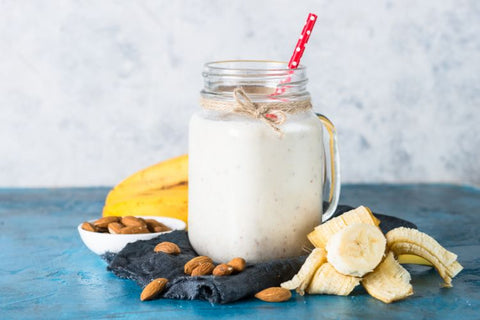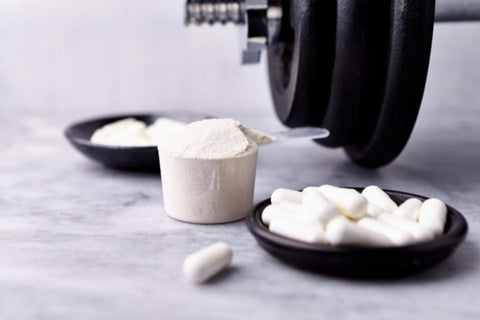While protein is crucial for fetal development, most pregnant women can meet their increased needs through a balanced diet rich in protein sources like lean meats, fish, eggs, beans, and dairy. However, protein powder may be helpful for those experiencing nausea, food aversions, dietary restrictions, or convenience challenges. Here’s a deeper dive into using protein powder during pregnancy:
Consultation with Healthcare Provider

Pregnant women considering protein powder need to be cautious. While it can help meet increased protein needs during pregnancy, several factors require attention. First, not all powders are created equal. Some may contain unsafe ingredients or heavy metals. Second, choose a powder that fits any dietary restrictions you have. Remember, protein powder should never replace a balanced diet rich in various nutrients this is where consulting with a healthcare provider comes in. Let’s look at some key considerations.
Considerations for Pregnant Women and Protein Powders
- Increased protein needs: Pregnancy increases your protein needs to support the growth and development of the baby. Protein powder can be a convenient way to help meet those needs, especially if you struggle to get enough through food alone.
- Ingredient safety: Not all protein powders are created equal. Some may contain artificial sweeteners, additives, or herbs that might not be safe during pregnancy. Look for options with minimal, pregnancy-safe ingredients.
- Heavy metal content: Certain protein powders, particularly plant-based ones, can contain traces of heavy metals like lead or mercury. A healthcare provider can help you select brands with minimal contamination.
- Dietary restrictions: If you have allergies, or sensitivities, or follow a vegan diet, carefully choose a protein powder that fits your needs.
- Overall nutrient intake: Don't let protein supplements replace whole foods. A balanced diet rich in various nutrients is still essential. Protein powder should be an addition to your existing diet, not a substitute.
Why Consultation with a Healthcare Provider is Essential
- Personalized Advice: Your doctor or a registered dietitian can determine if you truly need protein supplements based on your diet. They'll recommend the best type and amount for your individual needs.
- Medical Conditions: If you have pre-existing health conditions, like kidney or liver problems, your healthcare provider will ensure protein powder is safe for you.
- Medication Interactions: Certain medications can interact with supplements. Your doctor will identify any potential conflicts.
- Brand Recommendations: Healthcare providers are often aware of reputable brands with higher quality and safety standards, especially ones geared towards pregnancy.
Adequate Protein Intake
Protein plays a significant role in the healthy development of a baby during pregnancy. It supports the growth of tissues and organs and provides the essential building blocks for the entire body. But how exactly does protein powder assist in this process, and why might a pregnant woman consider it as a supplement? Let's dive into the details:
How Protein Powder Supports Fetal Development
- Building Blocks: Proteins are made of amino acids, the essential building blocks for all body tissues. During pregnancy, these amino acids are crucial for the development of the baby's organs, muscles, bones, brain, and immune system.
- Growth and Development: Protein helps build new cells and tissues. It's particularly important during pregnancy because of the rapid growth and development the baby undergoes.
- Nutrient Transport: Proteins are vital for transporting essential nutrients across the placenta to the growing baby.
Supplementing Nutrient Gaps

During pregnancy, ensuring adequate nutrition becomes even more critical as you're not just nourishing yourself, but your growing baby as well. Protein powder can offer some unique solutions for expecting mothers facing dietary challenges. Here's how:
Addressing Nutritional Gaps
- Dietary Restrictions: Women with food allergies, or intolerances, or those following a vegan diet might struggle to obtain enough protein through their regular diet. Protein powder provides a convenient way to supplement protein intake and fill any nutritional gaps.
- Food Aversions: Pregnancy can bring about sudden food aversions, even to healthy, protein-rich foods. Protein powders, often in the form of shakes, can be easier to stomach, ensuring consistent protein intake.
The Importance of Essential Amino Acids
- Complete Protein Sources: Our bodies cannot produce certain amino acids – these are called essential amino acids. During pregnancy, ensuring you get all essential amino acids is vital for the baby's development. Many protein powders offer complete protein sources, providing all these essential building blocks.
- Varied Sources: Even if you generally follow a balanced diet, finding protein sources that cater to specific dietary restrictions or changing tastes can be hard. Protein powders add variety and flexibility to your nutrient intake.
Blood Sugar Regulation
During pregnancy, maintaining a healthy blood sugar balance is crucial for both mom and baby. While a balanced diet is paramount, protein powder can offer an additional tool to help manage blood sugar levels. Here's how incorporating protein powder into meals or snacks can contribute to stabilizing blood sugar and explore the importance of maintaining stable levels throughout pregnancy:

Stabilizing Blood Sugar with Protein Powder
- Slows Digestion: Protein takes longer to digest compared to simple carbohydrates, helping slow down the breakdown and absorption of glucose into the bloodstream. This prevents rapid spikes in blood sugar levels commonly experienced after consuming sugary foods.
- Reduces Cravings: Stable blood sugar levels help minimize cravings for sugary snacks, which can further support healthy blood sugar management.
- Promotes Satiety: Protein promotes a feeling of fullness, reducing the likelihood of overeating or reaching for unhealthy snacks between meals.
Importance of Stable Blood Sugar During Pregnancy
- Healthy Fetal Development: Uncontrolled blood sugar swings can negatively impact a baby's growth and development. Maintaining stable levels ensures proper nutrient delivery to the baby, crucial for healthy development.
- Prevents Gestational Diabetes: High blood sugar can increase the risk of gestational diabetes, a condition that can lead to complications for both mother and baby. Protein helps regulate blood sugar, lowering the risk.
- Reduces Pregnancy Discomfort: Stable blood sugar can help alleviate pregnancy symptoms like fatigue, nausea, and mood swings.
Ways to Incorporate
- Smoothies: Add a scoop of protein powder to your morning smoothie with fruits, vegetables, and healthy fats.
- Meal Replacements: If you're struggling with nausea, a protein shake can serve as a quick and easy light meal.
- Snacks: Mix protein powder into yogurt, oatmeal, or energy balls for a healthy, blood-sugar-friendly snack.
Weight Management
Managing weight gain is a common concern during pregnancy. While some weight gain is healthy and necessary, protein powder can be a useful tool for staying within the recommended ranges. Here's why pregnant women might consider it and how protein promotes satiety (feeling of fullness):
Why Protein Powder for Weight Management
- Boosting Protein Intake: Pregnancy increases protein requirements. Meeting these needs with protein powder can help in managing overall calorie intake while supporting fetal development.
- Preventing Unhealthy Cravings: When you feel satisfied and full, you're less likely to reach for unhealthy snacks or overeat. Protein contributes to this feeling of fullness, promoting better control over food choices.
- Supporting Metabolism: Protein helps preserve muscle mass, which supports a healthy metabolism during pregnancy. A healthy metabolism can assist in managing weight gain.
Protein and Satiety
- Slows Digestion: Protein takes longer to digest than carbohydrates, keeping you feeling full for a longer duration.
- Hormonal Effects: Protein stimulates the release of hormones that signal fullness to the brain, making you feel less hungry overall.
- Reduces Blood Sugar Spikes: Protein helps stabilize blood sugar levels. Stable blood sugar helps prevent energy crashes and cravings that often lead to overeating.
Varied Protein Sources
The availability of various protein powder options, including plant-based alternatives, offers significant advantages for pregnant women with specific diet needs. Here's how this diversity benefits them:
Advantages of Variety
- Accommodating Dietary Restrictions: Pregnant women with allergies or intolerances to dairy or animal-based products can choose from plant-based protein powders made from sources like peas, hemp, rice, or soy.
- Catering to Preferences: Options like vegan protein powders align with ethical considerations or simply the taste preferences of some women.
- Addressing Food Aversions: Pregnancy can cause aversions to certain foods, even healthy ones. Having different protein powder flavors and textures can help find what's tolerable during these sensitive times.
- Diverse Nutrient Profiles: Various sources offer different vitamins, minerals, and amino acid profiles. This variety adds further richness to the expectant mother's nutritional intake.
Supporting Nutritional Needs
- Meeting Protein Demands: Adequate protein consumption is even more crucial during pregnancy. Diverse options ensure women can find suitable sources to meet their specific needs.
- Essential Nutrients: Plant-based protein powders are often fortified with vitamins and minerals vital for pregnancy, such as iron, B12, and folate, further supporting healthy development.
- Addressing Gaps: For women with dietary restrictions or aversions impacting protein intake, supplementing their diet with the right protein powder helps fill any nutritional gaps.
Hydration Support
Adequate hydration is essential for everyone, but it becomes even more crucial during pregnancy. Consuming protein powder mixed with liquids can be a convenient way to boost both protein intake and fluid levels, providing benefits for both mother and baby.
Why Mixing Protein Powder with Liquids is Beneficial for Hydration
- Increased Fluid Intake: Simply mixing protein powder with water, milk, or other liquids increases your overall fluid consumption.
- Enhanced Electrolytes: Some protein powders contain added electrolytes, which help regulate fluid balance and are important for preventing dehydration.
- Convenience: Protein shakes provide a quick and easy way to get both nutrients and fluids, especially when nausea or food aversions make it challenging to stay hydrated through food alone.
How Hydration Impacts Maternal and Fetal Health
- Improved Blood Circulation: Proper hydration supports healthy blood volume, aiding in the delivery of oxygen and nutrients to the baby.
- Reduced Risk of Complications: Staying hydrated may help lower risks like constipation, urinary tract infections, overheating, and even preterm labor.
- Cellular Function: Water is crucial for all cellular processes in both the mother's and baby's bodies.
- Fetal Development: Adequate amniotic fluid, largely dependent on maternal hydration, is vital for the baby's growth and provides cushioning in the womb.
Individualized Needs
Protein plays a critical role throughout pregnancy, supporting the development of the baby while also maintaining the mother's health. However, the specific protein needs of each woman can vary significantly based on several factors. This section explores how protein powders, with their customizable nature, can help meet these individual requirements and why tailoring protein intake is crucial during pregnancy.
The Customizable Nature of Protein Powder
- Adjustable Serving Sizes: Protein powders allow for flexible portion control to tailor your intake to your specific needs. You can increase or decrease the amount of powder used based on your goals and dietary recommendations.
- Mix-in Options: Adding protein powder to smoothies, yogurt, or other foods lets you further control and personalize your protein intake while incorporating other nutrients.
- Variety of Flavors and Types: The wide range of protein powder options (whey, plant-based, flavored, unflavored) allows women to cater to their preferences and dietary restrictions.
Why Tailoring Protein Intake is Important During Pregnancy
- Age: Younger pregnant women often have higher protein requirements compared to older women due to their own continued growth needs in addition to supporting the baby.
- Weight: Protein needs to increase with body weight. A woman who is overweight or obese may need a different amount of protein compared to a woman of average weight.
- Overall Health: Women with certain health conditions may have specific protein requirements that need to be managed in consultation with their healthcare providers.
- Activity Level: Pregnant women who are highly active may need slightly more protein than those with a more sedentary lifestyle.
- Stage of Pregnancy: Protein needs generally increase throughout pregnancy as the baby grows.
Key Takeaways
- Before using protein powder, talk to your healthcare provider to ensure safety and personalized advice.
- Consider ingredients, dietary needs, and overall nutrition.
- Protein is vital for a baby's growth, and powder helps if you struggle to get enough from food.
- It provides essential building blocks for a baby's organs and tissues.
- Protein powder supplements diets with restrictions or aversions, ensuring steady intake.
- It offers complete proteins and essential amino acids crucial for a baby's development.r
- Protein powder helps stabilize blood sugar levels, reducing diabetes risk and supporting the baby's health.
- It slows digestion, curbs cravings, and keeps you feeling full.
- Protein powder aids in healthy weight gain by promoting fullness and supporting metabolism.
- It prevents overeating and unhealthy cravings.
- Different protein options cater to various dietary needs and preferences.
- Plant-based choices offer flexibility for allergies or ethical considerations.
- Fortified powders provide extra vitamins and minerals for maternal and fetal health.
- Look for quality ingredients and consider dietary restrictions.
- Mixing powder with liquids boosts fluid intake, essential for both mom and baby.
- Hydration supports circulation, reduces risks, and aids cellular function.
- Adjust serving sizes and types of powder based on individual needs and preferences.
- Consult with your doctor for tailored advice on protein intake.






